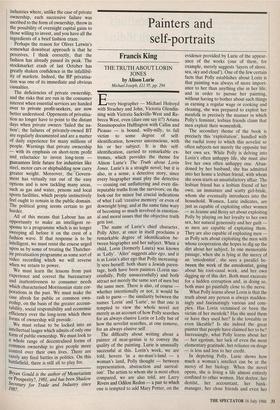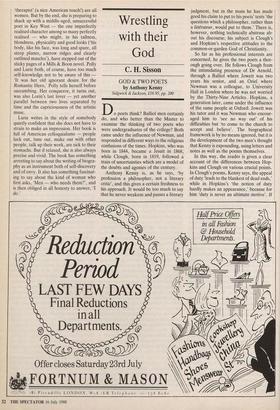Painters and self-portraits
Francis King
THE TRUTH ABOUT LORIN JONES by Alison Lurie
Michael Joseph, £11.95, pp. 294
Every biographer — Michael Holroyd with Strachey and John, Victoria Glendin- ning with Victoria Sackville-West and Re- becca West, even (dare one say it?) Ariana Stassinopoulos Huffington with Callas and Picasso — is bound, willy-nilly, to fall victim to some degree of self- identification, however unconscious, with his or her subject. It is this self- identification, carried to remarkable ex- tremes, which provides the theme for Alison Lurie's The Truth about Lorin Jones. Lurie's is a straight novel; but it is also, in a sense, a detective story, since every biographer must play the detective — coaxing out unflattering and even dis- reputable truths from the survivors; on the look-out for minor but crucial indications of what I call 'creative memory' or even of downright lying; and at the same time wary of becoming so much involved in emotion- al and moral issues that the objective truth gets lost. The name of Lurie's chief character, Polly Alter, at once in itself proclaims a remarkable degree of identification be- tween biographer and her subject. When a child, Lorin (formerly Laura) was known as 'Lolly'. 'Alter' suggests alter ego, and it is as Lorin's alter ego that Polly increasing- ly sees herself: both share a Jewish paren- tage, both have been painters (Lorin suc- cessfully, Polly unsuccessfully) and both attract not merely the same sort of men but the same men. There is also, of course whether intentionally or not, it would be rash to guess — the similarity between the names 'Lorin' and 'Lurie', so that one is tempted to view the whole novel not merely as an account of how Polly searches for an always elusive Lorin or Lolly but of how the novelist searches, at one remove, for an always elusive self.
The difficulty about writing about a painter of near-genius is to convey the quality of the painting. Lurie is unusually successful at this. Lorin's work, we are told, hovers 'in a no-man's-land — a woman's land, Polly thought — between representation, abstraction and surreal- ism'. The artists to whom she is most often compared, we are also told, are Larry Rivers and Odilon Redon — a pair to which one is tempted to add Mary Potter, on the evidence provided by Lurie of the appear- ance of the works (one of them, for example, merely suggests 'layers of shore, sea, sky and cloud'). One of the few certain facts that Polly establishes about Lorin is that painting was always of more import- ance to her than anything else in her life; and in order to pursue her painting, without having to bother about such things as earning a regular wage or cooking and cleaning, she was prepared to exploit her menfolk in precisely the manner in which Polly's feminist, lesbian friends claim that men exploit their womenfolk.
The secondary theme of the book is precisely this 'exploitation', handled with the rueful irony to which this novelist so often subjects not merely the opposite but her own sex. While Polly is delving into Lorin's often unhappy life, she must also live her own often unhappy one. Aban- doned by her husband, she has admitted into her home a lesbian friend, with whom she soon starts an unsatisfactory affair. The lesbian friend has a lesbian friend of her own, an immature and scatty girl-bride, whom she eventually introduces into the household. Women, Lurie indicates, are just as capable of exploiting other women — as Jeanne and Betsy set about exploiting Polly by playing on her loyalty to her own sex, her natural generosity and her guilt as men are capable of exploiting them. They are also capable of exploiting men as Polly sets about exploiting the men with whose cooperation she hopes to dig up the dirt about her subject. In one memorable passage, when she is lying at the mercy of an `entodontist', she sees a parallel be- tween the work of the entodontist, going about his root-canal work, and her own digging up of this dirt. Both must excavate for a hidden corruption and, in doing so, both must go painfully close to the nerve.
What Polly learns about Lorin is that the truth about any person is always madden- ingly and fascinatingly various and com- plex. Has Lorin victimised or been the victim of her menfolk? Has she used them or have they used her? Is she loveable or even likeable? Is she indeed the great painter that people have claimed her to be? Increasingly, what Polly learns about her — her egotism, her lack of even the most elementary gratitude, her reliance on drugs — is less and less to her credit.
In depicting Polly, Lurie shows how much a woman's intellect can be at the mercy of her biology. When the novel opens, she is living a life almost entirely confined to other women. Her doctor, her dentist, her accountant, her bank- manager, her close friends and even her 'therapist' (a nice American touch!) are all women. But by the end, she is preparing to shack up with a middle-aged, unsuccessful poet in Key West — the one imperfectly realised character among so many perfectly realised — who might, in his tallness, blondness, physicality and good looks (`his body, like his face, was long and spare, all steep planes, narrow ridges and clearly outlined muscles'), have stepped out of the sticky pages of a Mills & Boon novel. Polly and Lurie both, of course, have too much self-knowledge not to be aware of this 'It was her old ignorant desire for the Romantic Hero,' Polly tells herself before succumbing. Her conqueror, it turns out, was also Lorin's last lover — yet another parallel between two lives separated by time and the capriciousness of the artistic muse.
Lurie writes in the style of somebody quietly confident that she does not have to strain to make an impression. Her book is full of American colloquialisms — people luck out, tune out, make out with other people, talk up their work, are sick to their stomachs. But if relaxed, she is also always precise and vivid. The book has something arresting to say about the writing of biogra- phy as an instrument both of self-discovery and of envy. It also has something fascinat- ing to say about the kind of woman who first asks, 'Men — who needs them?', and is then obliged in all honesty to answer. 'I do.'



















































 Previous page
Previous page